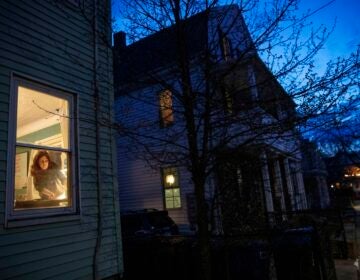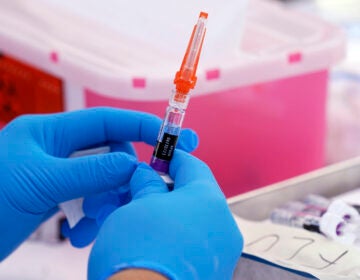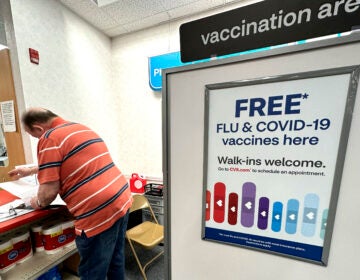N.J. death toll tops 100 as coronavirus stretches hospitals increasingly thin
"These aren’t abstract numbers,’ Gov. Phil Murphy said. ‘These are our neighbors, our family, our friends."
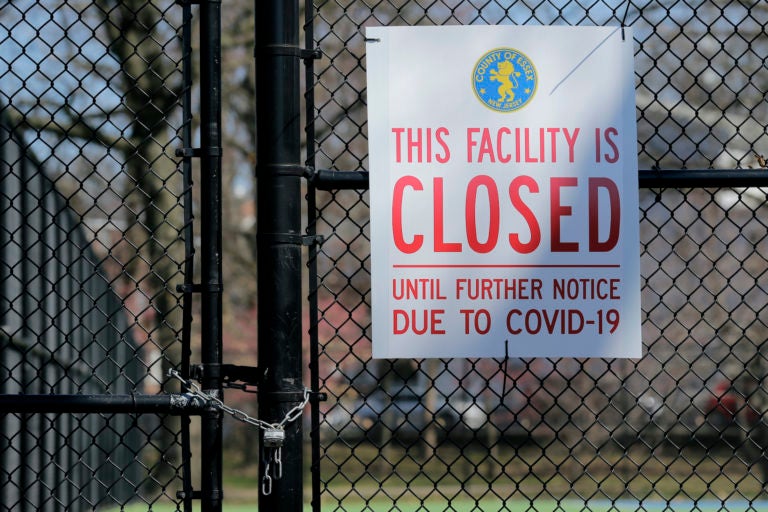
A sign is displayed on locked tennis courts in Branch Brook Park in Newark, N.J., Thursday, March 26, 2020. (Seth Wenig/AP Photo)
Updated: 3:45 p.m.
Twenty-seven more New Jerseyans have lost their lives to complications from the coronavirus, Gov. Phil Murphy announced Friday, bringing the statewide death toll to 108.
“These aren’t abstract numbers,” Murphy said at his daily news briefing. “These are our neighbors, our family, our friends. All of us — we are in this together, and we mourn together.”
Murphy also announced that confirmed COVID-19 cases continue to climb unabated. The 1,982 new cases announced Friday means New Jersey has now seen 8,825 cases total, which is second-highest in the nation after New York.
That uptick is attributable not only to the virus spreading between individuals, but also to efforts by the state, counties, local governments and health systems to expand their testing capacity.
“I continue to urge everyone in the strongest possible terms to continue practicing social distancing and to stay at home as much as possible,” Murphy said.
Worries about ventilator availability
As quickly as cases are rising now, state Health Commissioner Judith Persichilli said she expects a “surge” around mid-April and in anticipation has directed all hospitals to double their number of critical care beds.
“We believe we’ll be fine handling the critical care surge,” she said, but ventilators “are another story.”
“We believe right now we have enough ventilators,” she said. “If the surge results in more individuals needing ventilators than our projections, we certainly need to get ventilators in reserve.”
New Jersey currently has about 2,000 critical care beds and 1,700 ventilators, which have proven critical to keeping alive those patients hardest hit by COVID-19.
Persichilli said there should be a one-to-one ratio of ventilators to critical care beds. As hospitals double those beds, the state has requested — but has not yet received — 2,300 additional ventilators from the federal government.
N.J. short thousands of hospital beds, model says
A separate projection released Thursday by researchers at Rutgers-Camden predicts that hospital bed shortages could begin in Morris County as early as next week, with other counties following closely behind.
There’s already evidence of that happening at individual hospitals. Doctors at Holy Name Medical Center in Teaneck have described their workplace as a “war zone,” and CarePoint Health, which operates three hospitals in Hudson County, says it is on the verge of running out of ventilators.
The timing of the shortages — whether next week or later — depends on the effectiveness of the strict social distancing policies the governor has put in place, according to the study.
If those policies succeed at slowing the spread of the virus, hospitals in Morris County would still be the first to be overwhelmed, but not until late April at the earliest, the study predicts. Bergen County, which is at the epicenter of New Jersey’s outbreak, could see bed shortages beginning in late May.
While the idea of hospitals running out of space at any date is alarming, a delay would buy hospitals valuable time to increase their stock of ventilators and other critical equipment needed to care for COVID-19 patients.
According to the Rutgers-Camden model, New Jersey could be at least 60,000 hospital beds short across all the counties combined. But its creators added that a hospital bed shortage is not a foregone conclusion.
“We do know that extreme social distancing measures (as implemented in China and South Korea) can flatten the curve completely, so that hospitals never reach capacity,” they wrote in their research brief. “However, we also know that even stay-at-home orders do not completely flatten the curve (as demonstrated in Italy prior to March 25).”
Murphy pleas for volunteers
The state needs to “go to the bullpen” to reinforce its front-line medical workers, Murphy said Friday in calling for volunteers to help battle the coronavirus.
“This isn’t just for New Jersey residents either. We’re looking across our nation for help,” he said. “Retired nurses or doctors, nursing and medical students, EMTs, former members of our armed services medical corps, any of the above, any of the above. If you have training, we need you.”
Volunteers can sign up via a state web portal. Murphy said the state is trying to arrange transportation and housing for anyone who is interested.
A separate state web page is accepting donations of personal protective equipment.
Election-day voter registration for N.J. primary?
Gov. Phil Murphy said Thursday he still had not decided what to do about the state’s June 2 primary election — whether to postpone it or make other arrangements in the midst of a public health crisis.
Whenever that vote is held, the state needs to relax voter registration deadlines and take other steps to ensure fair and accessible elections, a coalition of voting rights advocates said Thursday.
In a letter to Murphy and Secretary of State Tahesha Way, the coalition called on the state to launch an online voter registration system and allow election-day voter registration. It also suggested sending vote-by-mail ballots with prepaid return envelopes to all registered voters.
While the state should encourage voting by mail, counties should also maintain in-person polling places that are properly sanitized for those who cannot mail in their ballots, the coalition said.
“We understand that there are no easy decisions,” sayd the letter from the New Jersey Institute for Social Justice, League of Women Voters of New Jersey and American Civil Liberties Union of New Jersey. “Every decision made during these trying times comes with repercussions and we thank you for your leadership in making these tough calls.”
Murphy previously rescheduled local elections in March and April to May 12 and ordered all voting to be done by mail.
WHYY is your source for fact-based, in-depth journalism and information. As a nonprofit organization, we rely on financial support from readers like you. Please give today.


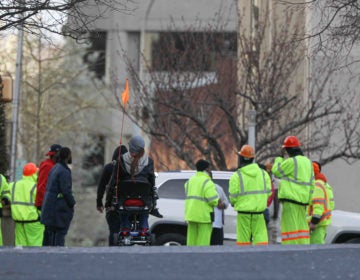
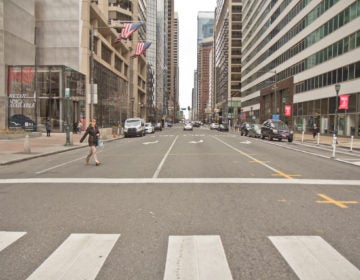
![CoronavirusPandemic_1024x512[1]](https://whyy.org/wp-content/uploads/2020/03/CoronavirusPandemic_1024x5121-300x150.jpg)
